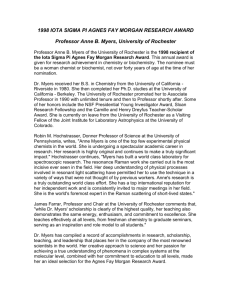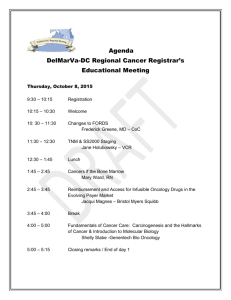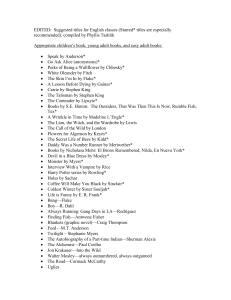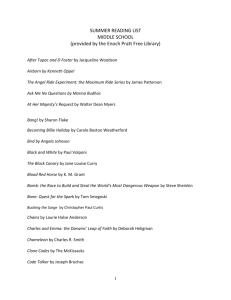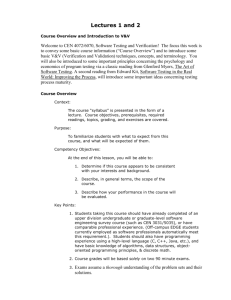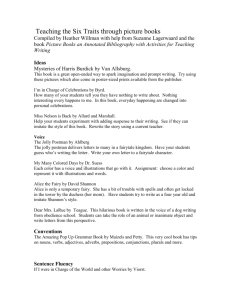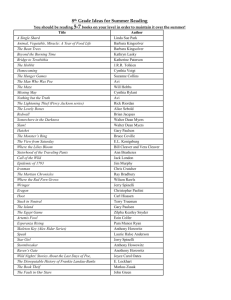Syllabus: Survey of Social Psychology Psyc. 430, Spring, 2004
advertisement
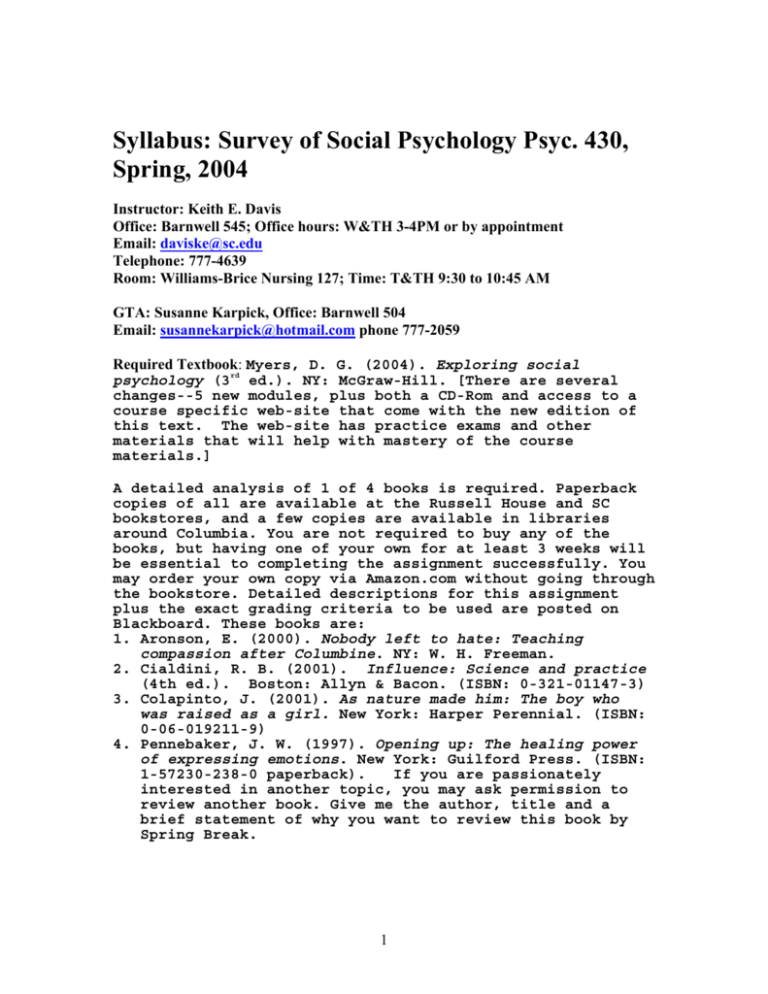
Syllabus: Survey of Social Psychology Psyc. 430, Spring, 2004 Instructor: Keith E. Davis Office: Barnwell 545; Office hours: W&TH 3-4PM or by appointment Email: daviske@sc.edu Telephone: 777-4639 Room: Williams-Brice Nursing 127; Time: T&TH 9:30 to 10:45 AM GTA: Susanne Karpick, Office: Barnwell 504 Email: susannekarpick@hotmail.com phone 777-2059 Required Textbook: Myers, D. G. (2004). Exploring social rd psychology (3 ed.). NY: McGraw-Hill. [There are several changes--5 new modules, plus both a CD-Rom and access to a course specific web-site that come with the new edition of this text. The web-site has practice exams and other materials that will help with mastery of the course materials.] A detailed analysis of 1 of 4 books is required. Paperback copies of all are available at the Russell House and SC bookstores, and a few copies are available in libraries around Columbia. You are not required to buy any of the books, but having one of your own for at least 3 weeks will be essential to completing the assignment successfully. You may order your own copy via Amazon.com without going through the bookstore. Detailed descriptions for this assignment plus the exact grading criteria to be used are posted on Blackboard. These books are: 1. Aronson, E. (2000). Nobody left to hate: Teaching compassion after Columbine. NY: W. H. Freeman. 2. Cialdini, R. B. (2001). Influence: Science and practice (4th ed.). Boston: Allyn & Bacon. (ISBN: 0-321-01147-3) 3. Colapinto, J. (2001). As nature made him: The boy who was raised as a girl. New York: Harper Perennial. (ISBN: 0-06-019211-9) 4. Pennebaker, J. W. (1997). Opening up: The healing power of expressing emotions. New York: Guilford Press. (ISBN: 1-57230-238-0 paperback). If you are passionately interested in another topic, you may ask permission to review another book. Give me the author, title and a brief statement of why you want to review this book by Spring Break. 1 Handling Blackboard: The new version (6.0) may be better than previous versions, but I am trying to figure out ways to make students less dependent on being able to get on BB. One method is to have each student activate their local usc email which all end with “mailbox.edu” and connect this to your preferred email address. That way, I can email the class notices, updated class notes, assignment changes as attachments and thus you will Not have to sign on to BB everyday to get these. You will have to sign on to BB for the basic notes and practice exams. Your exam grades will be posted on BB. Goals of the course: To develop a mastery of concepts and issues required for an understanding of persons and their social behavior in the real world. The course will have both a theoretical and a practical emphasis. On the theoretical side, I shall expect you to identify and explain the important concepts and major theories relevant to the course's subject matter. On the practical side, I shall provide you with exercises and opportunities to apply the concepts to your own lives and relationships. Course format: lecture (about 67%) and class exercises, videos, and discussions (about 33%). Requirement and basis of grade. Total Points Possible in the Course: 425. They will be divided up into 3 categories: 1.Participation in class discussions, demonstrations, and in research exercises done in class (with this category being worth a total of 25 points); 2. A detailed analysis of a social psychological book (100 points); and 3. Four exams, with your grade being based on the best three of the four (300 points). Participation & research exercises (Total of 25 points): Reading assigned material prior to class and being prepared to participate in class discussions of the material and taking part in the research demonstrations that illustrate key concepts. There will be 6 in-class exercises, each worth five points. You must complete 5 of the 6 to get the full 25 points credit for this section. No make-ups will be allowed for these exercises. 2 In-depth analysis of a social psychological book (100 points). Each student will pick 1 of the 4 books above and provide a critical book review that identifies the major contributions of the book, the methods used to reach the conclusions, the strengths and limitations of the research cited by the author to support his or her conclusions. Each student is expected to consult one or more published review of the book by a professional author and to use the information in that review to strengthen their paper. Detailed instructions will be provided on blackboard and we will devote part of 1 class period to a discussion of how to do this well. Reports will be due by 4:30 PM on Th, March 25. Each class period after that, 5 points will be deducted from your paper grade. Papers not turned in by April 15 will not be accepted. Exams (300 points). Comprehension of lectures and assigned readings will be tested in four hourly exams (one of which is the final), each of which is worth 100 points. These exams will consist of 50 multiple-choice questions, each of which is worth 2 points. The option of making up an exam is granted only to students who arrange with the professor in advance of the exam or who have documentation of an extreme emergency. All special exemptions must be confirmed with the professor in writing via email or a written note—not just orally. Otherwise, when you miss the exam, you have a grade of zero for that exam. At the time of the final exam, you may choose not to take it if you are satisfied with your course grade without the final. If you take the final, I will automatically count your 3 best exams. Grading system. The grading system is an absolute standard based on the number of points earned out of the required 425 points. The definition of the points required for each grade are as follows: A (385); B+ (365); B (340); C+ (325); C (300); D+ (285); D (255), & F (254 or less). In order to check your grades and prevent mistakes, it is your responsibility to retain all OPSCAN test forms for each exam, retain a copy of your critical book report (separate from your computer hard copy), and retain the informed consent forms for any research that you participate in. If you think that we have made an error in your grade, you must be able to produce these in order to get that grade corrected. Extra credit: Up to 5 points of extra credit will be available for students willing to participate in approved department of psychology research. Each credit hour = 1 point. Logon and Sign up at http://www.cla.sc.edu/PSYC/ugpartpool.html. 3 Schedule of Lecture Topics 1/13: Course overview, get acquainted exercise, and the Concepts of Intentional Action and Persons. 1/15: Doing social research (Myers 1 &2) plus notes on BB. 1/20: Self-concept (in-class exercise). (Myers 3) 1/22: Self-serving bias & positive thinking (Myers 4,5) 1/27: Fundamental attributional error (Myers 6) 1/29: Intuition (Myers 7) 2/3: Reason & unreason (Myers 8) 2/5: Behavior & Belief (Myers 9) 2/10: Exam 1 2/12: Exams ret.; Implications of social cognition & belief dynamics for clinical topics (Myers 10-11; notes on BB) 2/17: continuation. 2/19: Evolutionary Social Psychology (Myers 12) 2/24: Gender & Cultural Norms (Myers 13) 2/26: Obedience & Conformity (Myers 14) 3/2: Methods of persuasion (Myers 15) A good book report. 3/4: Brainwashing & cults (Myers 16) 3/8-12: Spring break 3/16: Exam 2 3/18: Exams returned; Social facilitation (Myers 17 & 18) 3/23: Doing together what we would never do alone (Myers 19) 3/25: Book reports due; Groups & group think (Myers 20) 3/30: Power to the person (Myers 21) 4/1: Prejudice & diversity (Myers 22-23) 4/6: [Exam 3 moved to 4/8] 4/8: Exam3 4/13: Aggression & media (Myers 24-25) 4/15: Relationships (Myers 26-27) 4/20: More relationships 4/22: Helping (Myers 30) 4/27: Conflict & its resolution (Myers 28-29) Final Exam: T, 5/4 at 9 AM in our regular classroom. Final Exam: Covers material since exam 3. 4
